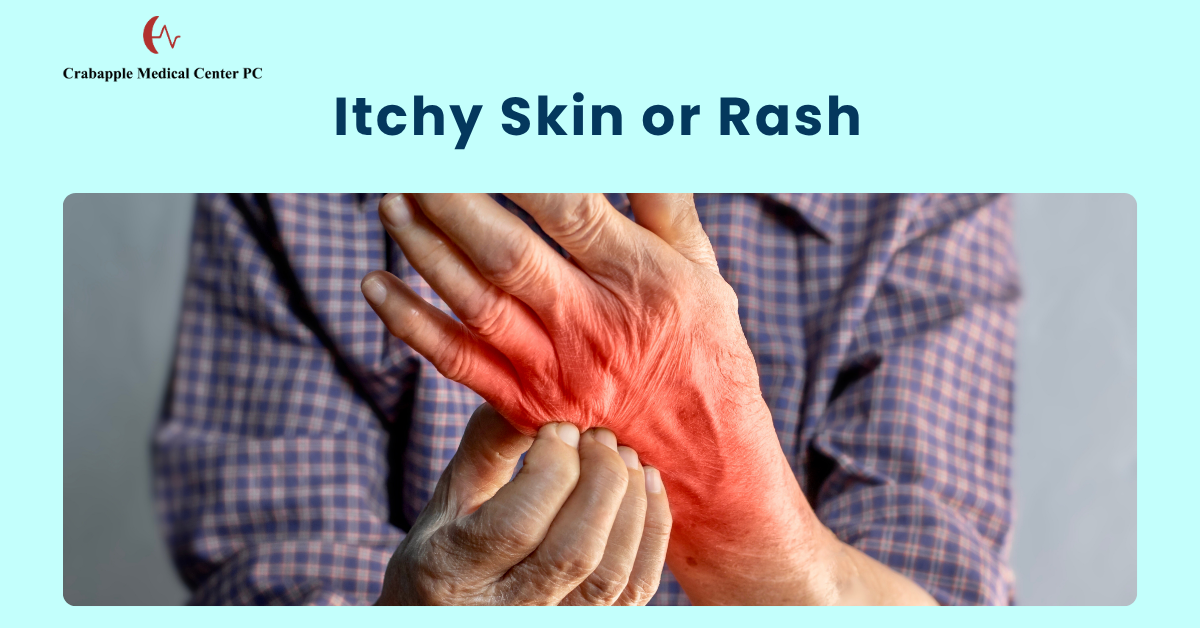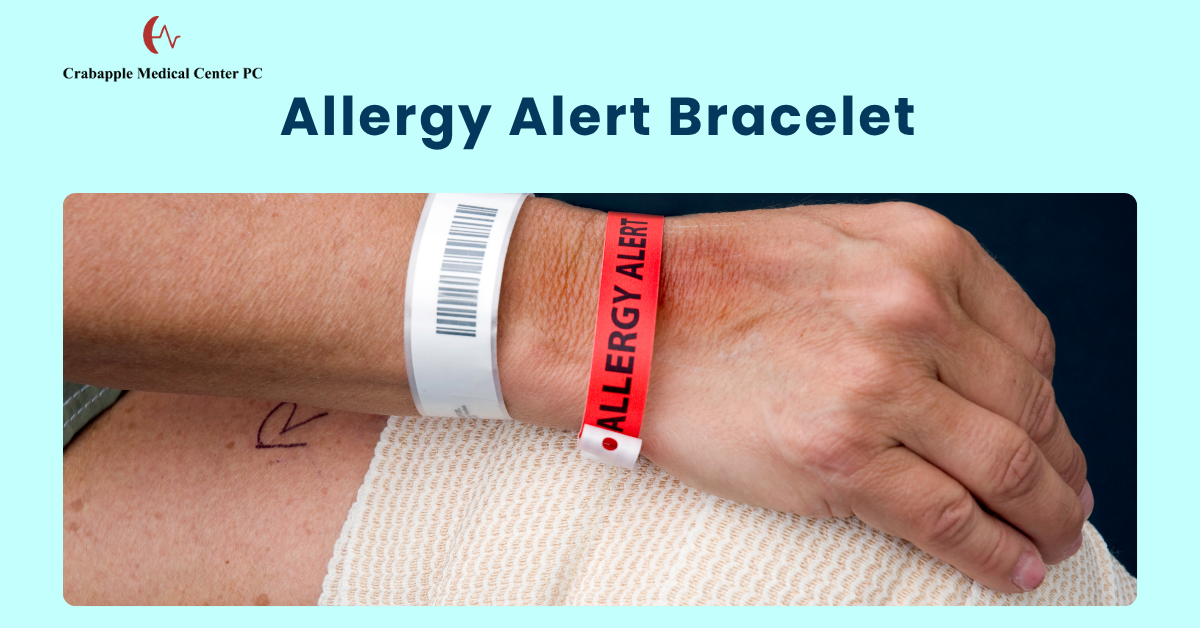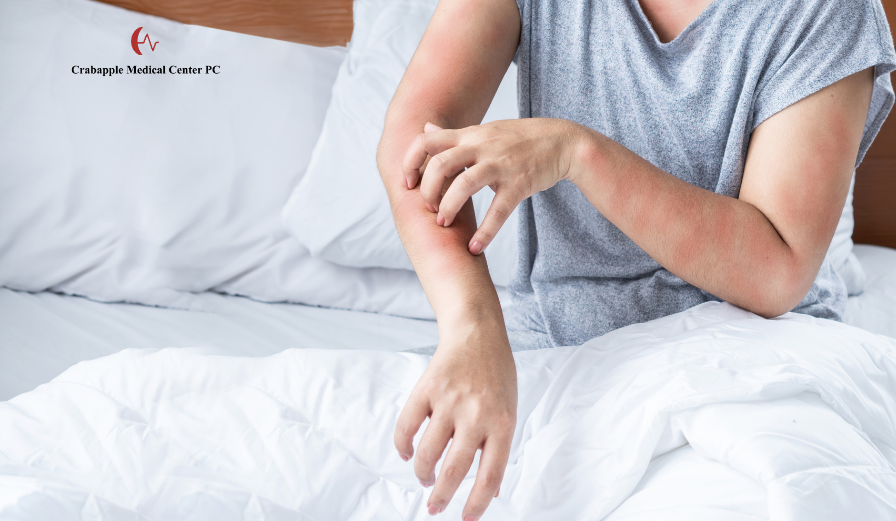Allergic reactions can range from mild discomfort to life-threatening emergencies, with some escalating quickly. An acute allergic reaction is a severe, rapid response from the immune system to an allergen, and if left untreated, it can be fatal. At Crabapple Medical Center, we provide expert care for individuals with allergies, ensuring quick, effective treatment to prevent serious complications and improve overall well-being.
What is an Acute Allergic Reaction?
An acute allergic reaction occurs when the immune system mistakenly identifies a harmless substance (an allergen) as a dangerous pathogen. In response, the immune system overreacts, releasing chemicals such as histamine that cause symptoms such as swelling, itching, and difficulty breathing.
Immune System Overreaction
When an allergen enters the body, the immune system usually responds by producing antibodies. In the case of allergies, the immune system’s response is exaggerated, leading to symptoms that range from mild discomfort to severe conditions, including anaphylaxis, which can be fatal without prompt treatment.
Types of Allergic Reactions
- Mild Reactions: These reactions may involve itching, rashes, or sneezing.
- Moderate Reactions: These reactions can include symptoms such as difficulty breathing or gastrointestinal issues like vomiting or diarrhea.
- Severe Reactions (Anaphylaxis): Anaphylaxis is a rapid and severe allergic reaction that can lead to shock, loss of consciousness, and even death if not treated immediately.
Signs and Symptoms of Acute Allergic Reactions
It’s vital to recognize the signs and symptoms of an acute allergic reaction as soon as they appear. Symptoms can vary from mild discomfort to life-threatening conditions, such as anaphylaxis.
Mild Symptoms
- Itchy Skin or Rash: The skin may develop hives, rashes, or itching, which may be localized or spread throughout the body.

- Sneezing and Watery Eyes: Many individuals with seasonal or environmental allergies may experience sneezing, a runny nose, and itchy or watery eyes.
- Swelling: Swelling may occur around the eyes, lips, or throat.
- Nausea and Vomiting: Some individuals may feel nauseous or vomit because of an allergic reaction, especially with food allergens.
Moderate Symptoms
- Shortness of Breath: Individuals may begin to feel a tightness in their chest, wheezing, or difficulty breathing.
- Throat Tightness: Swelling in the throat can cause difficulty swallowing or speaking.
- Dizziness or Light-headedness: As the body reacts to the allergen, blood pressure may drop, causing the person to feel faint or lightheaded.
Severe Symptoms (Anaphylaxis)
Anaphylaxis is a life-threatening reaction and requires immediate medical intervention. Symptoms of anaphylaxis include:
- Severe Difficulty Breathing: The person may struggle to breathe due to swelling of the airway or constriction of the bronchi.
- Swelling of the Throat, Tongue, or Lips: This can cause obstruction of the airways, making breathing extremely difficult.
- Rapid Drop in Blood Pressure: A sharp drop in blood pressure can cause dizziness, fainting, and shock.
- Loss of Consciousness: In severe cases, the person may lose consciousness or experience cardiac arrest.
Recognizing Symptoms Early
Recognizing the symptoms of an allergic reaction early can make all the difference. Immediate action is essential, especially in cases of anaphylaxis, where time is critical.
Common Triggers of Acute Allergic Reactions
An acute allergic reaction can be triggered by various allergens. Understanding the common triggers is essential in preventing and managing allergic reactions.

1. Food Allergies
Food allergies are one of the most common causes of severe allergic reactions. Some of the most common food allergens include:
- Peanuts
- Shellfish
- Milk
- Eggs
- Tree Nuts (e.g., walnuts, almonds)
- Wheat and Soy
2. Insect Stings or Bites
Insects like bees, wasps, and hornets can cause allergic reactions, particularly in individuals who are sensitive to their venom. People who have had a previous sting or bite may be at greater risk for a severe allergic reaction.
3. Medications
Certain medications, such as antibiotics (e.g., penicillin), NSAIDs (e.g., aspirin), and other drugs, can cause allergic reactions. It is important for individuals to inform their doctors about any known allergies before taking medications.
4. Environmental Allergens
Environmental allergens can trigger allergic reactions, especially in individuals with seasonal allergies. Common environmental triggers include:
- Pollen
- Dust Mites
- Mold
- Pet Dander
5. Latex
Latex allergies can cause severe reactions in some individuals. This is most common among healthcare workers who are frequently exposed to latex gloves or other latex products.
Immediate Steps to Take When an Acute Allergic Reaction Occurs
If you or someone else is experiencing an allergic reaction, it is critical to act quickly. Here are the immediate steps to take in the event of an acute allergic reaction, especially if anaphylaxis is suspected.
1. Call for Help
Call 911 or emergency services immediately if the person shows signs of severe symptoms, such as difficulty breathing, throat swelling, or loss of consciousness. Time is of the essence, and medical professionals need to intervene as soon as possible.
2. Administer Epinephrine
If the person has been prescribed an epinephrine auto-injector (e.g., EpiPen), it should be used immediately. Epinephrine is a life-saving medication that can reverse many of the symptoms of anaphylaxis, such as:
- Constriction of blood vessels to increase blood pressure
- Relaxation of airway muscles to help with breathing
- Decreased release of histamine, reducing swelling and hives
The epinephrine should be injected into the outer thigh muscle. If the person is unable to administer the epinephrine themselves, someone else should do so.
3. Lay the Person Down
In the case of a severe reaction, particularly if the person is feeling faint or weak, it is important to lay them down and elevate their legs. This helps with blood circulation and reduces the risk of shock.
4. Monitor the Person’s Condition
After administering epinephrine, continue to monitor the person closely. If their symptoms worsen or they lose consciousness, perform CPR if you are trained and continue to stay calm and supportive.
If symptoms do not improve, a second dose of epinephrine may be required. Always inform emergency responders of the first dose administered.
5. Be Prepared for Additional Doses of Epinephrine
Epinephrine is often effective, but its effects can wear off. Emergency medical personnel may need to administer additional doses of epinephrine or other treatments. Make sure to inform them of the doses already administered.
How to Prevent Acute Allergic Reactions
Although not all allergic reactions can be avoided, there are measures that can help reduce the risk of exposure to allergens and manage allergies effectively.
1. Identify and Avoid Allergens
The first step in preventing allergic reactions is identifying the specific allergens that trigger them. If you’re unsure what you’re allergic to, you should undergo allergy testing, such as a skin test or blood test. Once the allergens are identified, avoid them as much as possible.
- Food Allergies: Always read ingredient labels and inform restaurants about your allergies.
- Insect Stings: Avoid areas with high insect activity and wear protective clothing.
- Medications: Inform your doctor about any known allergies to prevent the prescription of triggering medications.
- Environmental Allergens: Use air purifiers and avoid exposure during peak pollen seasons.
2. Always Carry an Epinephrine Auto-Injector
For people who have experienced severe allergic reactions in the past, it is essential to always carry an epinephrine auto-injector. These devices are easy to use and can provide immediate relief during an allergic emergency.

3. Wear an Allergy Alert Bracelet
An allergy alert bracelet is a simple but effective tool that can help inform others of your allergies in an emergency. This can be especially helpful if you’re unable to communicate your allergies during a reaction.
When to Seek Medical Attention
Even if you’ve administered epinephrine and the symptoms seem to improve, it’s important to seek medical attention. The effects of epinephrine can wear off, and symptoms may return. Always follow up with a healthcare provider after experiencing an acute allergic reaction.
Watch for Recurrence of Symptoms
In some cases, symptoms may return after initial relief, especially after the effects of epinephrine wear off. It is critical to monitor the person’s condition and act quickly if symptoms recur.
Allergy Testing and Long-Term Management
For those who suffer from frequent allergic reactions, allergy testing can help identify specific allergens and guide treatment. At Crabapple Medical Center, we offer allergy testing services that can help pinpoint the cause of your allergies and assist in creating a management plan.
Be Prepared: Manage Allergic Reactions Effectively
Managing an acute allergic reaction requires knowledge, preparation, and quick action. Recognizing the symptoms early and administering epinephrine immediately can be lifesaving. If you or someone you know is prone to severe allergic reactions, ensure that you have an allergy management plan in place, including carrying an epinephrine auto-injector and being aware of your triggers.
If you’re in Alpharetta GA and need allergy testing, treatment, or follow-up care, Crabapple Medical Center is here to help. Don’t wait until an emergency happens, take proactive steps today to ensure that you’re prepared for any allergic reaction.
Frequently Asked Questions
What are the common causes of acute allergic reactions?
The most common causes of acute allergic reactions include:
- Food allergies (e.g., peanuts, shellfish)
- Insect stings or bites (e.g., bee stings, wasp stings)
- Medications (e.g., antibiotics, pain relievers)
- Environmental allergens (e.g., pollen, mold, dust mites)
- Latex (e.g., latex gloves, balloons)
How do I know if I’m experiencing anaphylaxis?
Anaphylaxis is a severe, life-threatening allergic reaction that occurs rapidly. Symptoms include:
- Difficulty breathing
- Swelling of the throat, lips, or tongue
- Rapid or weak pulse
- Dizziness or fainting
- Loss of consciousness
If you experience these symptoms, seek emergency medical help immediately.
When should I seek medical attention after an allergic reaction?
Even after treating an allergic reaction with epinephrine, you should seek medical attention immediately. The effects of epinephrine can wear off, and symptoms may return. Medical professionals can provide further treatment and monitor your condition.
Can an epinephrine auto-injector be used more than once?
Yes, if symptoms do not improve or return after the first dose, a second dose of epinephrine can be administered. Ensure that emergency medical personnel are informed of the initial dose and seek medical help immediately after administering the second dose.
How long do the effects of epinephrine last?
The effects of epinephrine typically last between 10 to 20 minutes. It works quickly to reverse symptoms of anaphylaxis, such as airway constriction and low blood pressure. However, the effects can wear off, and further medical attention is necessary to prevent symptoms from returning.
Can food allergies cause an acute allergic reaction?
Yes, food allergies are a major cause of acute allergic reactions. Common food allergens like peanuts, shellfish, eggs, and milk can trigger severe reactions, including anaphylaxis. Always carry an epinephrine auto-injector if you have food allergies, and inform restaurants and others about your allergies to avoid exposure.
How can I manage insect sting allergies?
To manage insect sting allergies:
- Wear protective clothing when outdoors, especially in areas known for high insect activity.
- Avoid brightly colored clothing or floral scents, as they attract insects.
- If stung, immediately administer epinephrine if you have been prescribed an auto-injector.
- Seek medical attention if symptoms worsen.
What should I do if I have a known medication allergy?
If you have a known medication allergy, avoid taking medications that could trigger a reaction. Always inform your doctor about your allergies before starting any new treatment or prescription. In case of an allergic reaction to a medication, seek immediate medical attention.
What is the role of an allergy alert bracelet?
An allergy alert bracelet is a wearable device that informs others of your allergies in an emergency. This is especially helpful if you are unable to communicate your allergies during a severe reaction. The bracelet typically includes critical information such as the allergen and emergency contact numbers.
Are there any long-term solutions for managing severe allergic reactions?
Yes, long-term solutions to manage severe allergic reactions include:
- Allergy testing to identify specific triggers.
- Immunotherapy (allergy shots) to desensitize the immune system to allergens over time.
- Allergen avoidance strategies based on the results of allergy testing.
- Regular follow-up visits with your healthcare provider to update your treatment plan.
What should I do if my child experiences an allergic reaction?
If your child experiences an allergic reaction:
- Administer epinephrine immediately if they have been prescribed an auto-injector.
- Call 911 or emergency services right away.
- Monitor their condition closely and be prepared to administer a second dose of epinephrine if necessary.
- Stay calm and provide reassurance while waiting for medical help.

